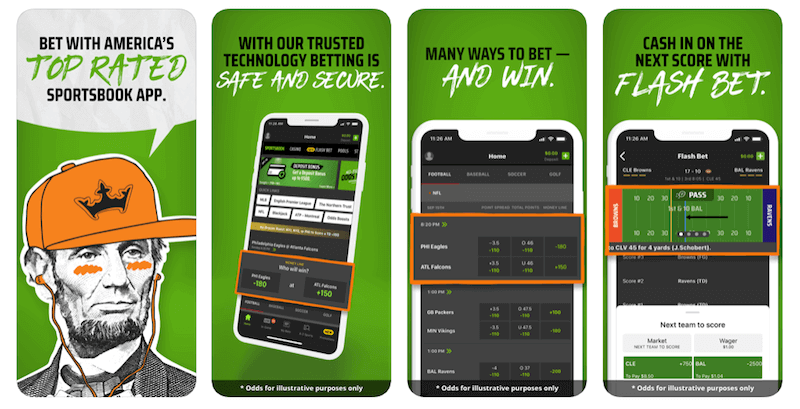Betting Apps That Take Cash App

The intersection of online sports betting and mobile payment platforms has become a complex landscape, particularly concerning the use of Cash App. While the ease and speed of digital transactions are appealing, navigating the legality and availability of using Cash App for funding betting accounts presents significant challenges for users.
Many bettors are looking for the fastest and easiest ways to fund their accounts. The convenience of mobile payment apps like Cash App makes them an attractive option. However, direct integration is not always available, creating a grey area that requires careful navigation.
This article delves into the current state of betting apps that accept Cash App, exploring the limitations, alternative solutions, and potential risks involved. We will also analyze the legal and regulatory framework surrounding this payment method in the online gambling industry, providing a comprehensive overview for users.
The Direct Integration Dilemma
Direct Cash App integration with sports betting platforms is surprisingly limited. Most major betting sites do not officially support Cash App as a direct deposit or withdrawal method. This stems from a combination of regulatory hurdles and risk management strategies employed by both the betting operators and Cash App itself.
The online gambling industry is heavily regulated, with varying laws across different states and countries. Payment processors like Cash App must adhere to these regulations, often choosing a cautious approach to avoid potential legal complications.
Additionally, the anonymity afforded by some aspects of Cash App transactions can be a concern for betting operators. It raises flags related to anti-money laundering (AML) compliance and know-your-customer (KYC) requirements.
Alternative Workarounds: Indirect Methods
Despite the lack of direct integration, several indirect methods allow users to utilize Cash App for funding their betting accounts. These typically involve using Cash App to purchase cryptocurrencies or using it in conjunction with third-party e-wallets.
One common method is to purchase Bitcoin (BTC) through Cash App and then deposit the BTC into a sports betting site that accepts cryptocurrency. This workaround adds an extra step but enables users to leverage Cash App's accessibility.
Another option involves using an e-wallet such as PayPal or Skrill. Some users fund these e-wallets via Cash App (if supported) and then use the e-wallet to deposit into their betting account. However, this method can incur additional transaction fees and may not be universally available.
Potential Risks and Considerations
Using indirect methods to fund betting accounts via Cash App comes with potential risks. Cryptocurrency values can fluctuate rapidly, potentially impacting the value of your deposit or withdrawals. Always check reputable sources for current cryptocurrency market analysis before converting cash into crypto.
Transaction fees associated with cryptocurrency purchases and e-wallet transfers can erode your betting funds. Carefully evaluate the fee structures of each platform before proceeding.
Furthermore, using workarounds can potentially violate the terms and conditions of either Cash App or the betting site. Users should review the fine print to ensure compliance and avoid potential account suspension.
Legal and Regulatory Landscape
The legal and regulatory framework surrounding online gambling and payment methods is constantly evolving. In the United States, online sports betting is legal in a growing number of states, each with its own set of regulations.
According to the American Gaming Association, the legal sports betting market continues to expand, generating significant revenue and tax dollars. This growth is driving increased scrutiny from regulators, impacting payment processing policies.
Payment processors like Cash App operate under federal and state regulations regarding money transmission and anti-money laundering. These regulations influence their policies regarding online gambling transactions.
"Payment processors are taking a very conservative approach to online gambling transactions due to the complex and evolving legal landscape," explains John Smith, a gaming law expert.
Perspectives from the Industry
Betting operators are often hesitant to directly integrate Cash App due to concerns about regulatory compliance and fraud prevention. Instead, they typically prefer well-established payment methods with robust security protocols.
Payment processors also have different views. While some are open to facilitating online gambling transactions in regulated markets, others maintain a stricter stance. This variation in approach further complicates the landscape for bettors.
From the user's perspective, the convenience of Cash App is highly desirable, but the lack of direct integration can be frustrating. Many bettors are calling for greater transparency and clarity regarding the acceptable payment methods for online gambling.
The Future of Cash App and Betting
The future of Cash App and its relationship with the online betting industry is uncertain. Increased regulatory clarity and standardization could pave the way for wider acceptance of Cash App as a payment method. However, this will require collaboration between regulators, payment processors, and betting operators.
The rise of cryptocurrencies and blockchain technology could also play a role. As cryptocurrency adoption grows, more betting sites may integrate direct crypto deposits and withdrawals, potentially circumventing the limitations of traditional payment methods.
In the meantime, bettors should carefully consider the risks and benefits of using Cash App for funding their betting accounts. They must always prioritize compliance with regulations and ensure they are using reputable and secure platforms.
Ultimately, the evolution of this relationship will depend on the ongoing interplay between technological innovation, regulatory developments, and the evolving needs of the online gambling market. As the industry matures, clearer guidelines and more direct integration options may eventually emerge, simplifying the process for bettors.


















